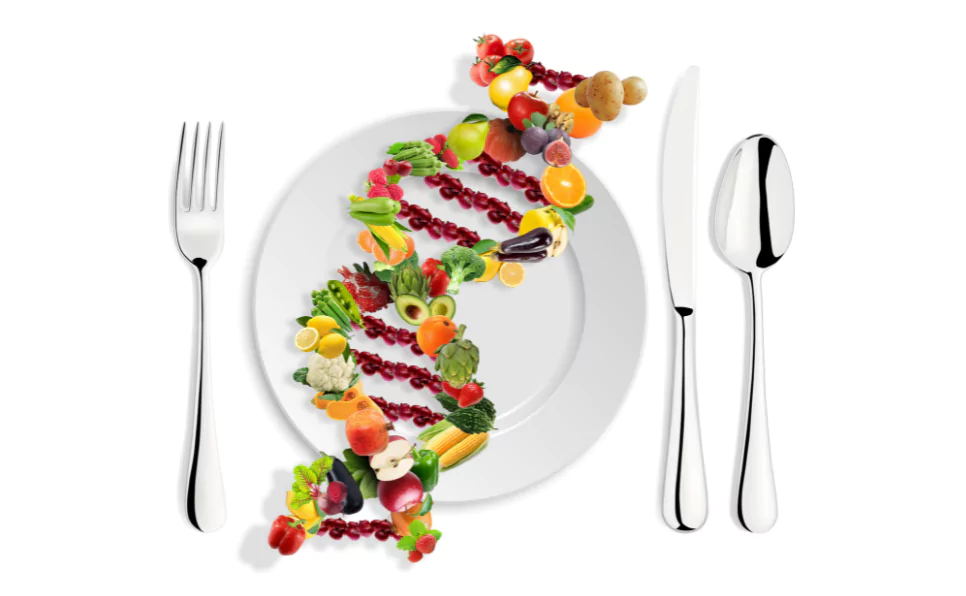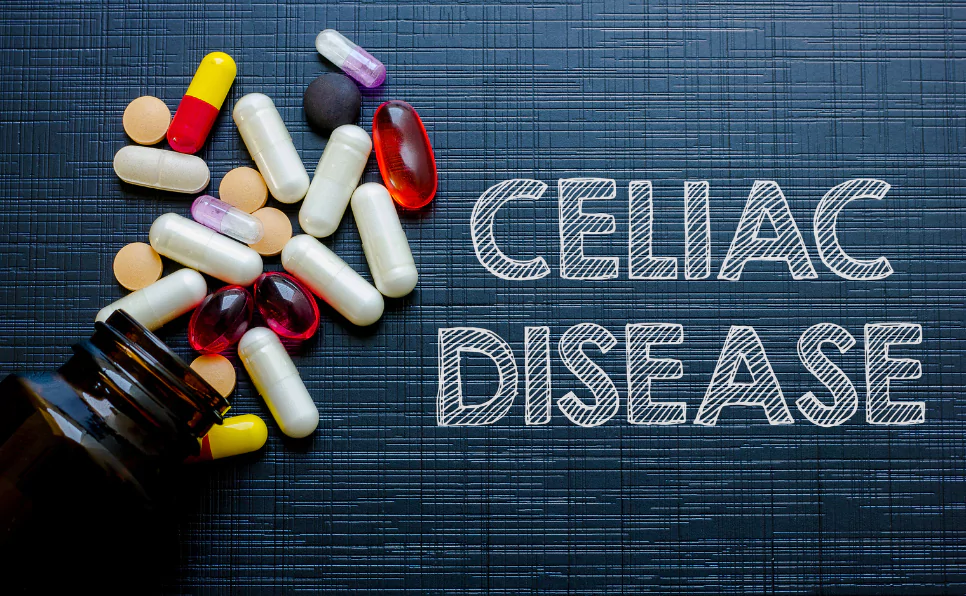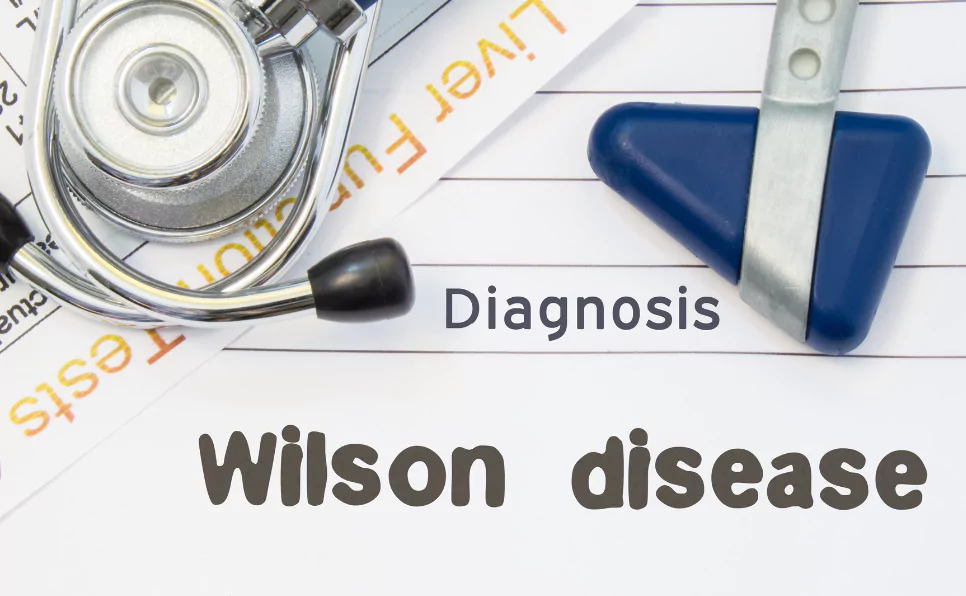Nutrigenomics is the science of how your food talks to your genes. It studies how what we eat can switch certain parts of our genes on or off, helping us avoid or treat diseases.
Nutrigenomics makes it clear that everyone is unique and can react differently to the same food due to their individual genetic makeup. This means we can use nutrigenomics to personalize our diets for better health.
In this article, we will take a look at the basic principles of nutrigenomics, such as the two-way interaction between genes and nutrition, and highlight the practical uses and challenges of this exciting new field.
Quick Note:
If you just want a quick overview: The relationship between genes and nutrition is bidirectional; while genes can dictate how we metabolize nutrients, the nutrients we consume can alter gene behavior. For example, some individuals might efficiently convert beta-carotene to vitamin A due to genetic variations, affecting their dietary needs. Conversely, nutrients like omega-3 fatty acids can modulate genes related to inflammation.
Nutrigenomics highlights the uniqueness of individual responses to food based on genetic makeup. It offers promising strategies for preventing or managing chronic diseases like obesity, diabetes, heart disease, and cancer, which are shaped by both genetics and lifestyle.
Nutrigenomics also aids in identifying disease risks and potential drug targets. Nutrigenomics can lead to personalized diets that cater to individual genetic profiles, promoting optimum health.
Keep on reading the article for more detailed insights.
The Nutritional Genetics: A Closer Look
Think of genes as small bits of DNA that contain recipes for making proteins, which are the essential building blocks of life. Proteins have many functions in our cells, like speeding up chemical reactions, moving molecules around, controlling gene behavior, and sending signals.
Tiny differences in these genes among individuals lead to different versions of proteins that can affect our health in various ways.
Nutrition is about getting and using food for energy, growth, repair, and maintenance of our bodies.
- It can impact how our genes behave by affecting the supply of molecules required for making, changing, and repairing DNA, such as vitamins, minerals, antioxidants, and certain chemical groups.
- It can also influence gene behavior by changing the activity of enzymes that control how genes work.
The relationship between genes and nutrition is a two-way street: genes can determine how we break down and react to nutrients, and nutrients can influence how our genes behave.
For example, some people might have a gene variation that lets them convert beta-carotene (which the body can change into vitamin A) into its active form more efficiently. This means that these people might need less beta-carotene in their nutrigenomics diet to get enough vitamin A than others.
Conversely, some nutrients can change the behavior of genes linked to inflammation, oxidative stress, cell regulation, and cell death, which can affect disease prevention and treatment.
For instance, omega-3 fatty acids can lower the activity of genes that cause inflammation and boost the activity of genes that defend against oxidative damage.
These are just some nutrigenomics examples that show how a nutrigenomic testing and subsequent diet plan can greatly impact our health.
Simplifying Nutrigenomics
Nutrigenomics seeks to understand how different types of food and nutrients can change the way our genes behave, and how our unique genetic variations can alter the way we react to different diets.
The ultimate aim of nutrigenomics is to help us find out how we can prevent or treat illnesses by adjusting our diet to match our unique genetic characteristics.
Nutrigenomics is also known as nutritional genetics, a term that covers various related fields such as nutrigenetics, nutrigenomics, and nutritional epigenetics.
Each of these fields help us understand different ways our genes respond to nutrients and show certain traits like risk of illness.
- Nutrigenetics looks into how different genes can influence the way our bodies react to our diet and the risk of getting certain diseases. For instance, some individuals may require more or less of certain vitamins or minerals based on their genetic makeup.
- Nutrigenomics, on the other hand, explores how our diet can change the way our genes work. Some types of food or nutrients may turn certain genes on or off, controlling things like blood sugar levels or the production of cholesterol.
- Nutritional epigenetics is the study of how diet can change the chemical tags on our DNA that control gene activity without altering the DNA itself. For example, certain foods or nutrients may influence how our DNA is modified, effectively turning genes on or off.
The Science and Tools of Nutrigenomics
Nutrigenomics is an area that brings together many scientific fields, like nutrition, genetics, biochemistry, molecular biology, physiology, and bioinformatics.
It uses advanced tools that can process and analyze large amounts of data, looking at various levels of biological information, such as genomics, transcriptomics, proteomics, and metabolomics.
Genomics is the study of the full set of DNA in an organism. It can help identify genetic differences that could change the way we react to certain nutrients or our risk of getting diseases.
Transcriptomics looks at all the RNA molecules in a cell or tissue, which can give us insight into how genes are behaving under different nutritional conditions or states of disease.
Proteomics is the study of all the proteins in a cell or tissue. This can give us insights into the structure and behavior of proteins involved in different processes in our body.
Metabolomics studies all the small molecules in a cell or tissue. This can help us understand changes in our body’s chemical reactions due to diet or diseases.
Examples of Nutrigenomics in the Human Body
Nutrigenomics gives us a deeper understanding of how our diet and genes work together to affect our health. Here are some examples:
- On a molecular level, nutrigenomics can show us how specific foods or nutrients can influence the way genes work. For example, curcumin, a compound found in turmeric, can control the genes involved in inflammation and cancer.
- At a cellular level, nutrigenomics can tell us how certain foods or nutrients can change cell functions. For instance, resveratrol, a compound found in red wine, can activate certain proteins that control metabolism and lifespan.
- On a tissue level, nutrigenomics can show us how certain foods or nutrients can influence the balance of tissues. For example, lycopene, a compound found in tomatoes, can slow down the formation of new blood vessels that support tumor growth.
- At an organ level, nutrigenomics can explain how certain foods or nutrients can affect how organs function. For instance, capsaicin, a compound found in chili peppers, can stimulate the release of a hormone that regulates sugar levels and appetite.
- On a system level, nutrigenomics can reveal how certain foods or nutrients can influence responses across our entire body. For instance, quercetin, a compound found in apples, can control the immune system by reducing inflammation and oxidative stress.
The Role of Nutrigenomics in Personalized Nutrition
Think of personalized nutrition as a diet plan designed specifically for you, taking into consideration your unique body needs and tastes.
This individualized food plan considers aspects like your genes, the way you live, your health condition, and the kind of environment you’re exposed to.
By focusing on these factors, personalized nutrition could help you achieve better health and fight or manage long-term diseases.
Nutrigenomics can tell us why people react differently to the same food or nutrient, based on their genetic code.
To give some nutrigenomics examples, some people may have genes that change the way they break down certain nutrients, like folate, caffeine, or omega-3 fatty acids.
It can also explain how compounds in our diet can control genes that are part of various biological functions, like inflammation, oxidative stress, or detoxification.
By incorporating nutrigenomics, personalized nutrition can give more exact and beneficial diet advice that fits a person’s genetic code.
Nutrigenomics can help track the effects of dietary changes on gene function and health markers. This process is known as nutrigenomic testing.
Examples of impact of nutrigenomics on personalized nutrition
There are many nutritional genomics studies showing how nutrigenomics can enhance personalized nutrition.
For instance, one study by Ordovas and team in 2018 showed that people with a specific variant of the APOA2 gene reacted differently to a diet rich in saturated fat, affecting their weight, waist size, and blood pressure.
This study suggested that nutritional advice based on APOA2 genotype could help prevent obesity and heart-related diseases.
In another study, Celis-Morales and colleagues in 2017 demonstrated that people with different FTO gene variants had varying responses to a weight-loss program, either low in fat or carbohydrates.
This research suggested that individualized diet advice, based on FTO genotype, could help enhance weight loss and boost metabolic health.
A third example, from a study by Ferguson and team in 2016, showed that people with different genetic variants in the GSTM1 gene reacted differently to an intervention involving broccoli, affecting DNA damage and oxidative stress.
The study indicated that personalized dietary advice, considering GSTM1 genotype, could control the cancer-fighting effects of broccoli and other similar vegetables.
These studies highlight how nutrigenomics can fine-tune nutrition and boost health results for different people. So when we ask “what is nutrigenomics?”, we can see it’s the exciting intersection of nutrition and genetics that can personalize your diet for optimum health.
Nutrigenomics and Disease Prevention
Nutrigenomics can helps us understand how different foods can change our gene activity and can impact our chances of getting certain diseases.
Nutrigenomics gives us tools to create personalized diet plans that are matched to our genes and can help prevent or treat diseases.
How nutrigenomics can help in disease prediction and prevention
Many diseases like obesity, diabetes, heart diseases, and cancer, are influenced by a combination of our genes and our environment.
Some of us might have specific genetic variations that make us more or less likely to get certain diseases. For instance, a person might have a variant in their genes that changes how their body processes caffeine, impacting their blood pressure and heart health.
Nutrigenomics allows us to identify these gene variants and see how they react to different nutrients and diets.
By studying our DNA, we can learn about our genetic strengths and weaknesses, and how we can change our diet to improve our health.
For instance, some people might need to eat more foods rich in folate, like leafy greens and beans, to reduce their chances of getting heart disease. Others might need to limit their intake of fats and cholesterol to prevent high blood pressure and high cholesterol levels.
Nutrigenomics also helps us observe the effects of our diet on our gene activity and health outcomes.
By monitoring markers like blood sugar, fats, inflammation, and oxidative stress, we can understand how our diet impacts our metabolism and cell functions.
Advanced technologies in nutritional genomics studies, like genomics, transcriptomics, proteomics, and metabolomics, can help us analyze changes in our DNA, RNA, proteins, and metabolites after eating certain foods.
These techniques can lead to new discoveries about how nutrition impacts health and disease on a molecular level.
Examples of nutrigenomics preventing disease
Nutrigenomics can be applied to many diseases and conditions that are related to nutrition and genetics.
Here are some examples of how nutrigenomics has helped prevent or treat diseases:
- Obesity: Nutrigenomics can help us understand how different genes influence our appetite, metabolism, energy expenditure, and fat storage. For instance, some people might have a gene variant that makes them less sensitive to leptin, a hormone that controls hunger and fullness. These people might need to consume fewer calories and exercise more to maintain a healthy weight. Nutrigenomics can also help us identify the best diet for weight loss based on our genetic profile. For example, some people might lose more weight on a low-carbohydrate diet than a low-fat diet, depending on their genes that affect carbohydrate metabolism.
- Diabetes: Nutrigenomics can help us predict our risk of developing type 2 diabetes based on our genes that affect insulin secretion and sensitivity, glucose uptake, and inflammation. For instance, some people might have a gene variant that increases their risk of diabetes if they consume a diet high in rapidly-digesting carbohydrates, which cause quick spikes in blood sugar levels. Nutrigenomics can also help us prevent or manage diabetes by tailoring our diet to improve our blood sugar control and insulin response. For example, some people might benefit from eating more fiber-rich foods, such as whole grains and fruits, to lower their blood sugar levels and increase their insulin sensitivity.
- Cardiovascular disease: Nutrigenomics can help us assess our risk of developing heart disease based on our genes that affect blood pressure, cholesterol levels, clotting factors, inflammation, and oxidative stress. For instance, some people might have a gene variant that makes them more likely to develop high blood pressure if they consume too much salt. Nutrigenomics can also help us prevent or treat cardiovascular disease by modifying our diet to improve our blood lipid profile and vascular function. For example, some people may benefit from eating more omega-3 fatty acids, such as fish oil or flaxseed oil, to lower their triglycerides and increase their HDL cholesterol levels.
Latest Research in Nutrigenomics and preventing diseases.
Nutrigenomics is a quickly developing field that constantly gives us new information about how diet and genes affect our health and diseases.
Here are some of the most recent discoveries in Nutrigenomics and disease prevention:
- A 2020 study found that a Mediterranean diet full of fruits, vegetables, olive oil, fish, nuts, and legumes can affect genes linked to inflammation, oxidative stress, fat metabolism, and insulin resistance in overweight individuals. The study also discovered that this diet can change the composition and function of gut bacteria, which can affect metabolic health and immunity.
- A 2019 study found that curcumin, a compound in turmeric, can cause changes in breast cancer cells that can slow their growth and spread. The study also found that curcumin can make breast cancer cells more sensitive to chemotherapy drugs by affecting the genes involved in drug resistance.
- A 2018 study found that resveratrol, a compound in red wine, grapes, berries, and peanuts, can protect against mental decline and Alzheimer’s disease as we age. This is achieved by affecting genes involved in brain cell growth, inflammation, and getting rid of harmful substances. The study also found that resveratrol can activate a gene that plays a crucial role in cell longevity and metabolism.
These are just some examples of how Nutrigenomics can give us new knowledge and chances for disease prevention and treatment through changing our diets.
Nutrigenomics and Weight Management
Nutrigenomics helps us learn how our genes influence our body’s reaction to different foods and diets.
For example, some people might have unique gene versions that change how their bodies burn energy, manage fat, or control hunger.
These gene differences can also raise or lower their risk of getting obesity-related illnesses like diabetes, high blood pressure, or heart disease.
By learning about our unique gene map, we can customize our diets and lifestyle to meet our specific needs and goals.
Nutrigenomics enables us to pick the right foods, nutrients, and supplements for our health and wellness. It can also help us steer clear of foods or nutrients that may not be good or effective for us.
How knowing our genes can help in losing and managing weight
Many people find it hard to lose weight or keep a healthy weight because they try to follow general diet advice that might not work for them. Nutrigenomics can help us figure out the best diet for our genes and improve our weight loss results.
For instance, studies in nutritional genomics show that people with a certain risk type of the FTO gene can benefit from eating a lot of protein.
This gene version changes how the body processes fat and protein, and how much it feels hungry or full. By eating more protein, these people can speed up their metabolism, feel less hungry, and stop muscle loss.
Another nutrigenomics example is that it can help us pick the best exercise for burning fat.
Some people have genes that make them respond better to strength training or cardio workouts. By understanding our gene map, we can choose the best workout for our body type and fitness level.
Examples of how nutrigenomics helps with weight management
There are several studies that show how effective nutrigenomics is for managing weight. One of these is the Nutrigenomics, Overweight/Obesity, and Weight Management (NOW) trial, which included nutrigenomic testing in a program to help overweight and obese adults change their lifestyle.
The participants got diet advice personalized for their genes, along with coaching and support for behavior change.
The study results showed that the nutrigenomics group had a better diet after 12 months than the control group.
They were also better at sticking to their diet recommendations and were more satisfied with their program. The study concluded that nutrigenomics can motivate long-term dietary change and sticking to it, even more than the best standard population-based programs.
Another example is the Food4Me trial, which looked at the effects of personalized diet advice based on different kinds of information: an online survey, blood markers, or gene markers.
For six months, participants got feedback tailored to their diet and physical activity through a website.
The study found that personalized diet advice based on gene markers resulted in a bigger decrease in body mass index (BMI) and body fat percentage than the other kinds of information.
The study suggested that nutrigenomics can improve the success of personalized nutrition programs in lowering the risk of obesity.
Challenges and Limitations of Nutrigenomics
Nutrigenomics opens the door to personalizing diets based on an individual’s genetic makeup.
However, there are ethical and practical problems that need to be tackled in the field of nutrigenomics, including questions about privacy and fairness.
Let’s discuss these challenges further.
A. Ethical and Social Questions about Nutrigenomics
The study of nutrigenomics involves collecting and analyzing people’s genetic information, which raises several ethical and social questions.
These include:
- Privacy and confidentiality: How can we ensure that genetic data is kept safe from misuse or unauthorized access? Who should have access to this data and who owns it? What are the rules around how long this data can be kept?
- Informed consent: How can we ensure that people understand what nutrigenomic testing involves and the benefits and risks it carries? How can we guarantee that people have given their consent willingly and with full understanding?
- Fairness and justice: How can we make nutrigenomics available and affordable to everyone, and not just a privileged few? How can we ensure that it doesn’t lead to discrimination based on genetic differences?
- Responsibility and accountability: Who should be held responsible for making sure that nutrigenomic tests and interventions are reliable and valid? Who will be held accountable if things go wrong?
- Education and communication: How can we communicate effectively about nutrigenomics to different people including the public, health professionals, policy makers, and researchers?
Efforts have been made to address these ethical and social issues, such as:
- The creation of ethical guidelines for nutrigenomics research.
- The development of regulations to oversee nutrigenomic testing.
- The provision of education and training for health professionals, researchers, and consumers about nutrigenomics.
- The launching of awareness campaigns to educate the public about nutrigenomics.
B. Technical Problems in Nutrigenomics
Nutrigenomics uses advanced scientific techniques to explore how nutrition affects our genes and health. However, this also introduces technical problems and limitations in its application.
Some of these are:
- Complexity and variability: The relationship between our genes, our diet, and our health is complex and varies greatly between individuals due to factors like genetic variations, lifestyle habits, and environmental exposure. This makes it hard to pinpoint cause-and-effect relationships between our genes, diet, and health outcomes.
- Reliability and validity: The techniques used in nutrigenomics are often expensive, time-consuming, and require a lot of manpower. They also have technical limitations such as low sensitivity or precision, and they can be affected by external factors like sample quality. So, it’s essential to make sure the data generated is reliable and valid.
- Utility and applicability: The data generated by nutrigenomics may not always be useful or applicable for health purposes. They might not provide clear or actionable information for preventing or treating diseases. Therefore, it’s crucial to evaluate how useful the data is for different purposes, and how it can be translated into practical recommendations.
C. Overcoming the Challenges in Nutrigenomics
Despite these problems, the field of nutrigenomics has made significant strides in improving our understanding of nutrition and health.
Here are some examples of how these problems are being tackled:
- Development of computational tools for analyzing large and complex nutrigenomics data sets.
- Creation of databases for storing and sharing nutrigenomics data among researchers.
- Conducting systematic reviews of evidence from nutrigenomics studies.
- Designing randomized controlled trials to test the efficacy of nutrigenomics interventions.
- Creation of guidelines to standardize and optimize the quality of nutrigenomics tests.
Nutrigenomics is an exciting field that could revolutionize the way we think about nutrition and health.
However, it faces significant ethical, legal, social, technical, and practical challenges. By addressing these challenges, nutrigenomics can provide us with a better understanding of how our genes, diet, and lifestyle interact to affect our health.
It can also offer more personalized and effective solutions for preventing and treating diseases.
The Future of Nutrigenomics
Nutrigenomic’s goal is to figure out how our entire body responds to the foods we consume, and how individual genes interact with specific food components.
In the future, nutrigenomics is expected to play a big role in what’s called “personalized nutrition.” This is where dietary advice is customized based on your own unique genes and nutritional needs.
With personalized nutrition, there’s potential to prevent and even treat many chronic illnesses like obesity, diabetes, heart disease, and cancer by figuring out the best diet and nutrient intake for each person.
Nutrigenomics also helps us understand how outside elements like pollution, stress, and our overall lifestyle can interact with our genes and diet to affect our health.
Here’s what we might see in the future with nutrigenomics playing a bigger part in healthcare and everyday living:
- Creation of new ways to measure nutritional status and risk of disease using genetic profiles.
- Development of foods and supplements that can target specific genes or pathways to maintain health and combat disease.
- Personalized dietary advice and coaching that takes into account genetic differences, changes in gene function, metabolic profiles, and gut bacteria.
- Education for the public and healthcare professionals about the benefits of nutrigenomics and personalized nutrition for promoting good health and preventing diseases.
Current trends in nutrigenomics research include:
- Studying the impact of compounds found in our diet, like polyphenols, curcumin, resveratrol, and lycopene, on gene function and the epigenome.
- Looking into how nutrigenomics can affect the immune system and inflammation.
- Exploring how nutrigenomics interacts with other areas like proteomics, metabolomics and transcriptomics to get a full picture of nutritional health.
- Carrying out large-scale human trials and population studies to back up the findings from animal and cell studies.
Final Words
Nutrigenomics is a fast-moving field that focuses on the relationship between our genes, our diet, and our health.
It holds the potential to completely transform the way we approach health and lifestyle, by offering personalized nutrition plans that can help prevent and treat a range of chronic diseases.
Nutrigenomics can also shed light on how environmental factors can impact the way our genes work and influence our health.
Nutrigenomics is crucial to our lives as it can help us maximize our health and happiness by pinpointing our unique nutritional needs and tastes. It also gives us the power to make informed food choices that match our genetic makeup and health objectives.
We recommend that you learn more about your own genetic makeup and dietary needs by talking with a nutrigenomics expert or taking a reliable nutrigenomic test. It’s important to remember that nutrigenomics isn’t a one-size-fits-all solution, but a personalized tool that can guide you towards your best health.
References:
- https://www.ncbi.nlm.nih.gov/pmc/articles/PMC3984860
- https://www.sciencedirect.com/topics/agricultural-and-biological-sciences/nutrigenomics
- https://pubmed.ncbi.nlm.nih.gov/32578026
- https://pubmed.ncbi.nlm.nih.gov/34844714
- https://pubmed.ncbi.nlm.nih.gov/29783447
- https://www.medscape.com/viewarticle/583041
- https://www.nutritionsociety.org/blog/nutrigenomics-basics
- https://www.tandfonline.com/doi/full/10.1080/10408398.2019.1571480
- https://www.sciencedirect.com/science/article/pii/S1044579X17301712
- https://www.intechopen.com/books/cancer-treatment-conventional-and-innovative-approaches/nutrigenomics-and-cancer-prevention
- https://pubmed.ncbi.nlm.nih.gov/30729798
- https://eatrightchicago.org/the-benefits-of-nutrigenomics-for-weight-loss
- https://health.clevelandclinic.org/how-does-nutrigenomics-work
- https://pubmed.ncbi.nlm.nih.gov/33515029
- https://www.ncbi.nlm.nih.gov/pmc/articles/PMC7664486
- https://nutrition.bmj.com/content/3/1/49
- https://bmcpublichealth.biomedcentral.com/articles/10.1186/s12889-019-6621-8

Dr. Renu Bala is a pioneering genetic researcher focused on neonatal and maternal health. Currently, a Post Doctoral Research Associate at the University of Exeter, UK, working on Diabetes and Depression. Her previous innovative studies have revealed key insights into the socio-demographic and nutritional factors influencing Preterm birth. Her work in substantial genetic awareness projects in India, along with her published research, underscores her significant contributions to the field.





